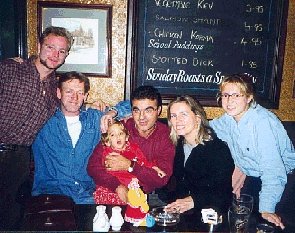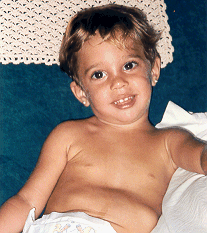Maria Jesús Candela
Maria Jesús Candela: Born 27th September 1996.
 |
 |
The following is a translation of a letter written by Maria Jesus's mother describing her daughter's history, symptoms and general state of health
Maria Jesús Candela was born on the 27th September 1996 weighing 3.3kg and measuring 51cm. When she was born she seemed to be a perfectly healthy girl, there weren't any problems at all. When she was 3 months old the paediatrician discovered that her mucus was slightly pale and prescribed iron. When she was 8 months old she was admitted to hospital because she kept vomiting, in the routine analysis they detected anaemia with a haemoglobin count of 7.8, the doctors proceeded to study the anaemia and discovered it was Haemolytic Anaemia, due to possible Sperocytis. Maria recovered from her vomiting, and when she was 10 old months they started to study her anaemia in a different hospital, San Juan University Hospital, at that time her Hb was 8.1. The same month she was rushed into hospital with a high fever and a Haemolytic Crisis, when she arrived at the hospital her Hb was 7.1 so she was given a transfusion of red blood cell concentrate. 3 days later she had recovered and was allowed to leave the hospital. In the meantime the doctors continued to study her anaemia, ruling out Sperocytis, but with possible Thalassemia. At the end of July 1997 she went into hospital again with a urine infection and because her Hb was 8.1, on that occasion she didn't need a transfusion and there were no more complications. At the end of August 1997, the study of her anaemia seemed to give positive results on the Thalassemia, however the paediatricians weren't sure so they repeated the tests. The paediatrician treating Maria then told us that they couldn't do any more tests in that hospital and they sent us to La Fe Hospital in Valencia. There they did tests on her bone marrow which gave normal results. When she was 1 year old she was was rushed to the hospital in San Juan with high fever, Pneumonia, and a Hb of 5.9. She was given her second transfusion of red cell concentrate and stayed in hospital for 6 days. In the meantime her blood samples, as well as ours (both parents), were sent to the Institute of Dr Vives-Corons in Barcelona.
At 15 months she went into hospital again with another urine infection, high fever and a Hb of 10.2. Two days later her Hb had dropped to 7.9 and the paediatrician opted for another red cell transfusion. While Maria was still in hospital we received the results of the blood analysis from Dr Vives-Corons who diagnosed the anaemia as TPI Deficiency. The paediatrician explained the gravity of this illness and told us there is nothing else we can do except wait. We decided to get a second opinion and in the Hospital "12 de octubre" in Madrid they repeated the tests and they gave the same results.(A translation of the report from this last test is enclosed below). Maria has had a CAT brain scan and Tests on her heart to see whether she had any cardiopathy, and all these results were normal. When Maria was 20 months old she went into hospital again with Pneumonia and the analysis showed her Hb to be 10.9. Despite the infection she didn't have a Haemolytic Crisis, and she has remained stable since then. To sum up, Maria has had 3 blood transfusions. The last one was 9 months ago and since then she seems to be stable. Maria Jesús was 2 years old on Sunday 26th September 1998, she can remain sitting up on her own, though at times it is hard for her to keep her balance. When she's in bed she keeps turning over, and she has fallen out of bed twice. She understands everything you say perfectly, and knows when she wants or doesn't want something. If you try to give her something she doesn't want, she shakes her head and points to the thing she does want. She knows perfectly well how to distinguish between Yes and No. She loves to colour, I sit her in her little chair with a piece of paper and lots of coloured pencils and she starts colouring the paper. She can't stand anything on her head, if I ever put a hat on her, she takes it off herself and throws it on the floor. She wants to do everything for herself, for example, when I comb her hair she takes the comb off me and starts to do it herself. She loves dolls, she touches their eyes then touches her own, to show us that she's got eyes too. She likes tickling herself on her ears and feet, When she is sitting on the sofa she can spend ages touching her feet and ears. She walks when she is supported by somebody's arm and she likes to go after a ball and kick it. She can remain standing up by herself when her back is resting against a wall, but she can only do it for a short time. She speaks very little and only uses bisyllables, pointing to anything she wants with her finger. She is very loving and spends all day giving kisses. In conclusion, she does not move like a child of her age should, but we can see that she is advancing little by little, because a few months ago she hardly moved at all and now she herself is making the effort to move more and more all the time. At the moment she is being treated with 6cc of Folinic Acid a day, 5c of Amoxillin to prevent possible infections, and for the last 12 days on your recommendation, we have been giving her a teaspoonful of cod liver oil which we got from the chemist's. Translation of the report from the test carried out by Haematology Dept, '12 de octubre' University Hospital, Madrid in June 1998.
Patient: Maria Jesús Candela Pastor Referred by Dr Joaquin Diaz Mediavilla to confirm TPI deficiency. With report from Paediatric Dept. San Juan Hospital. Suffering from chronic haemolytic anaemia which only required a transfusion 5 months ago. No neonatal jaundice. Generalised muscle rigidity. Pneumonia LII a month ago. Being treated with folic acid.
Referred to Dr. Vives-Corons for metabolic erythrocyte study and diagnosed with TPI Deficiency. Parents: No consanguinity. Both live in Crevillente (pop. 30,000). No family history of anaemia. Pregnancy normal. 1st child. Conclusion:
Maria Jesús (patient) has triose phosphate isomerase (TPI) activity of less than 30% when compared to the controls. Maria Jesús Pastor and Alfonso José Candela, (patient's patents), have TPI activity of less than 50% when compared to the controls. P.S.
Although most reported cases have TPI activity of between 5-20% of normal levels,, there are some cases with higher levels like this patent. In order to be completely certain that this is a case of TPI Deficiency, there should be an analysis of the DHAP erythrocyte quantities. Report signed by Dra Gilsanz, Head of Department on June 16th 1998 in Madrid.
End of report. If you would like to contact the Candela family via Michelle, please E-mail Michelle@
michelle@alc.es
